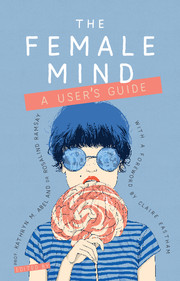Book contents
- Frontmatter
- Acknowledgements
- Contents
- Foreword
- Introduction: being female
- Part I Women in perspective
- 1 The history of the ‘female mind’
- 2 Gender-informed responses to women's distress
- 3 Female sexuality
- 4 Growing up female
- Part II Women and society
- Part III Women and their environment
- Part IV Women and specific disorders
- Part V Women and treatment
- Contributors
- Index
3 - Female sexuality
from Part I - Women in perspective
Published online by Cambridge University Press: 02 January 2018
- Frontmatter
- Acknowledgements
- Contents
- Foreword
- Introduction: being female
- Part I Women in perspective
- 1 The history of the ‘female mind’
- 2 Gender-informed responses to women's distress
- 3 Female sexuality
- 4 Growing up female
- Part II Women and society
- Part III Women and their environment
- Part IV Women and specific disorders
- Part V Women and treatment
- Contributors
- Index
Summary
Evelyn's story
Evelyn was 80 years old. Her childhood sweetheart, lifelong partner and soul mate – her husband – had recently died. I went to see her on a bereavement visit soon after the funeral. Evelyn invited me in and said there was something ‘embarrassing’ she needed to share with me, even more embarrassing given her generation and gender, and considering I was 30 and male. She tugged the leg of her trousers and said, ‘I started wearing these before women generally wore trousers, before the Second World War. My parents beat me badly as a child; my legs are scarred so I don't like people seeing them’. Then she nudged me, smiled and winked and said ‘My husband was always good to me – in the “bedroom department”’. But Evelyn's womb had dropped (her words), a uterine procidentia or prolapse, after her only child was born, and she had never told anyone in the 50 years since. She said that although her husband was always ‘good’ to her, sex always hurt and she never enjoyed it. She saw sex as an obligation, her marital duty.
‘Last week, a new lady doctor came to our surgery and she came out to visit me. I told her about my womb – the first person I have ever told – and she put something up inside me. I've been walking round with a smile on my face all week: do you think it's a sin?’
As we discussed this further, it became clear that Evelyn was having multiple orgasms associated with a newly fitted vaginal ring pessary. The bigger picture was that she had never had an orgasm before and felt guilty at the sense of dishonouring her husband's memory, as ‘this thing is giving me better feelings than the old man ever did!’ She was tempted to have it taken out – until I recommended she keep it and enjoy it!
(At the time of this visit, I was a registered nurse and Evelyn's local Catholic priest.)
The trouble with women…
The French philosopher Michel Foucault (1984) once asked poignantly ‘why we burden ourselves today with so much guilt for having once made sex a sin’. Various mental health fields of practice, across times and peoples, show how women have frequently been dogged by negative assumptions and treatment based solely on gender and/or sexual identity.
- Type
- Chapter
- Information
- The Female MindUser's Guide, pp. 19 - 22Publisher: Royal College of PsychiatristsPrint publication year: 2017

